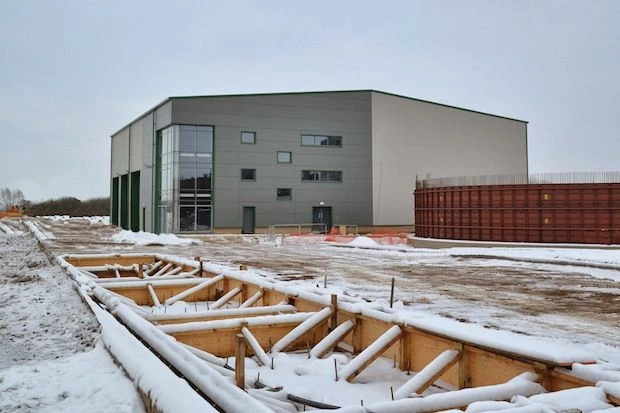
Partner Article
North East biogas energy project underway
Construction is near to completion on an £8m renewable energy project that will use food waste to power 2,000 homes.
Work on the County Durham-based anaerobic digestion (AD) facility is expected to end in March, and the site will start producing heat and energy from May 2013.
Based at Emerald Biogas on Newton Aycliffe Industrial Estate, the site will be capable of producing 1.56 MW of electricity and processing 50,000 tonnes of food each year.
The project will be the North East’s first commercial green energy plant, and will use the AD process to remove plastic, glass and metal traces from the food waste before it is sterilised and transferred to digestion tanks.
Millions of bacteria then feed on the food waste inside a vacuum to produce a methane-rich biogas, which is then turned into energy.
Excess heat generated from the plant will be used across the Newton Aycliffe Industrial Estate, while nearby landowners within a 10 mile radius will be supplied with the resultant digestate.
The plant is expected to be fully operational by July, and Emerald Biogas has already secured planning permission to expand the site to up to four times its current size.
Antony Warren, director at Emerald Biogas, said: “Once up and running, the facility will be the only one of its kind in the region and capable of not only providing renewable heat and electricity for neighbouring industrial companies, but also producing quality fertiliser from the digestate for use by the local agricultural community.
“We hope the facility will further boost the region’s reputation as a hub for renewable energy, as well as an economic boost for the local area.”
Also director to Emerald Biogas, Ian Bainbridge added: “We have invested in the latest AD technology which will result in a better quality product and a more efficient process, and will also enable the facility to expand further and maximise its full potential.
“Merging our expertise and knowledge of the industry and markets to develop this business seemed a natural step forward for all of us and we are very much looking forward to seeing the plant take shape and on to the next stage, operation.
“It is an environmentally and economically beneficial situation where energy produced, both heat and power, is fully utilised locally and this was the rationale for an industrial location as opposed to a rural site.”
Funding for the project was provided by HSBC, WRAP and the Rural Development Programme for England.
This was posted in Bdaily's Members' News section by Miranda Dobson .
Enjoy the read? Get Bdaily delivered.
Sign up to receive our daily bulletin, sent to your inbox, for free.








 Culture, confidence and creativity in the North East
Culture, confidence and creativity in the North East
 Putting in the groundwork to boost skills
Putting in the groundwork to boost skills
 £100,000 milestone drives forward STEM work
£100,000 milestone drives forward STEM work
 Restoring confidence for the economic road ahead
Restoring confidence for the economic road ahead
 Ready to scale? Buy-and-build offers opportunity
Ready to scale? Buy-and-build offers opportunity
 When will our regional economy grow?
When will our regional economy grow?
 Creating a thriving North East construction sector
Creating a thriving North East construction sector
 Why investors are still backing the North East
Why investors are still backing the North East
 Time to stop risking Britain’s family businesses
Time to stop risking Britain’s family businesses
 A year of growth, collaboration and impact
A year of growth, collaboration and impact
 2000 reasons for North East business positivity
2000 reasons for North East business positivity
 How to make your growth strategy deliver in 2026
How to make your growth strategy deliver in 2026